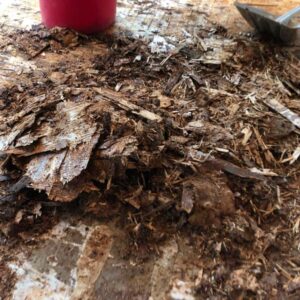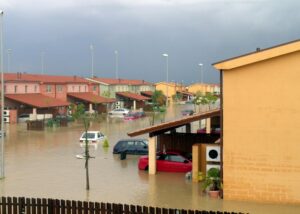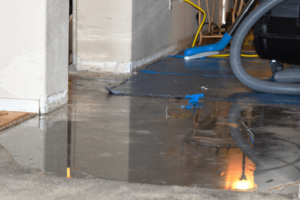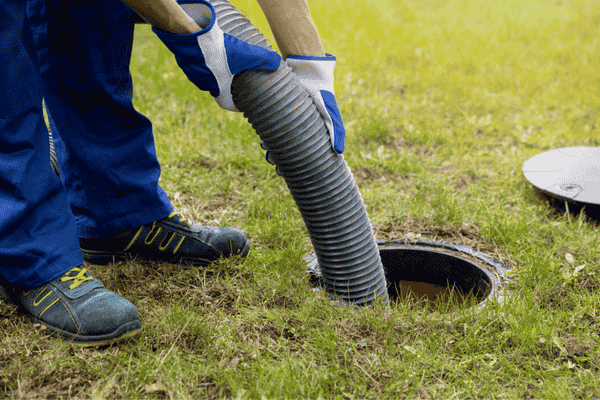When you think of water damage, you might picture a minor leak under the sink or a burst pipe soaking your carpet. But not all water damage is created equal. Some types, like Category 3 water damage—also known as “black water”—pose serious threats to your health and home.
At Sapphire Restoration, we’ve dealt with all types of water damage; black water is no joke. It’s not just dirty water; it’s a hazard that requires immediate attention and professional expertise. If you’re wondering what makes Category 3 water damage so serious and how to handle it, keep reading. We’ve got your back (and your home).
What Is Black Water Damage? Category 3 Explained

Let’s start with the basics: what exactly is black water? In the world of water damage, there are three categories:
-
Category 1 (Clean Water):
Water from a broken supply line or overflowed sink. It’s safe and easy to clean up.
-
Category 2 (Gray Water):
Water from appliances like dishwashers or washing machines. It’s slightly contaminated and requires more care.
-
Category 3 (Black Water):
Highly contaminated water that may contain harmful bacteria, viruses, and toxins.
Black water isn’t just unpleasant—it’s dangerous. It comes from sources like sewage backups, overflowing toilets, or floodwaters from rivers and streams. If it’s been sitting for a while, even clean water can turn into black water as it mixes with contaminants.
Read more from IICRC: Category of Loss and Class Descriptions
Where Does Black Water Come From? Common Sources

Black water can come from a variety of places, and some might surprise you. Here are the most common culprits:
- Sewage Backups: This is the most well-known source of black water. When your home’s plumbing backs up, raw sewage can flow into your living space.
- Floodwaters: During heavy rains or storms, floodwaters from rivers, streams, or oceans can carry dirt, debris, and contaminants into your home.
- Standing Water: If water is left stagnant for too long, it becomes a breeding ground for bacteria and turns into black water.
- Toilet Overflows: If the overflow involves waste, it’s considered black water due to the presence of harmful pathogens.
If any of these scenarios sound familiar, don’t wait. Black water needs immediate attention to minimize damage and protect your health.
Read more from our blog: Sewage Backups Solved: Cleanup Do’s and Don’ts Explained
The Health Risks of Black Water: Why You Should Act Fast
Let’s be blunt: black water is dangerous. It’s not something you want to wade through with a mop and bucket. The contaminants in black water can include bacteria like E. coli, viruses, and even chemicals that can cause serious health problems.
Exposure to black water can lead to:
- Respiratory Issues: Mold and bacteria can trigger allergies and respiratory problems.
- Infections: Cuts or scrapes exposed to black water can lead to serious infections.
- Illnesses: Pathogens in black water can cause stomach issues, fever, and other illnesses.
For your safety, it’s crucial to avoid contact with black water and let professionals handle the cleanup.
Structural Damage: What Black Water Does to Your Home
Black water doesn’t just harm your health—it wreaks havoc on your home too. Because it’s loaded with contaminants, it can cause severe damage to materials like:
-
Drywall and Insulation:
These materials absorb water like a sponge, and with black water, they become unsalvageable.
-
Flooring:
Wood floors can warp, while carpets and padding usually need to be replaced.
-
Furniture and Belongings:
Anything porous that’s been exposed to black water is likely contaminated and unsafe to keep.
The longer black water sits, the more damage it does. That’s why acting quickly is so important.
Why DIY Isn’t an Option: Professional Cleanup Is a Must
We get it—DIY projects can be tempting, especially when you’re trying to save money. But when it comes to black water, this is one situation where DIY isn’t just ineffective—it’s dangerous.
Here’s why you should leave black water cleanup to the pros:
-
Safety Equipment:
Professionals have the gear to safely handle contaminated water, including gloves, masks, and protective clothing.
-
Proper Disposal:
Black water requires special disposal methods to avoid spreading contaminants.
-
Thorough Cleanup:
We use specialized equipment to sanitize and restore your home, ensuring no hidden bacteria or mold is left behind.
At Sapphire Restoration, we’re trained to handle even the messiest black water situations, so you don’t have to put yourself or your family at risk.
The Cleanup Process: How We Handle Category 3 Water Damage

Wondering what happens when you call us for black water cleanup? Here’s a step-by-step look at our process:
-
Assessment and Containment:
We evaluate the extent of the damage and contain the affected area to prevent contamination from spreading.
-
Water Extraction:
Using industrial pumps, we remove the standing water quickly and efficiently.
-
Sanitization and Disinfection:
We clean and disinfect all surfaces to eliminate harmful pathogens.
-
Drying and Dehumidification:
Using high-powered equipment, we thoroughly dry the area to prevent mold growth.
-
Repairs and Restoration:
Finally, we repair or replace damaged materials, restoring your home to its pre-loss condition.
Our goal is to make your home safe and livable again as quickly as possible.
How to Prevent Category 3 Water Damage in the Future
Prevention is always better than cleanup. While you can’t control everything, there are steps you can take to reduce the risk of black water damage:
-
Maintain Your Plumbing:
Regular inspections can help catch small issues before they become big problems.
-
Install Backflow Valves:
These prevent sewage from backing up into your home during heavy rains or flooding.
-
Prepare for Flooding:
If you live in a flood-prone area, consider elevating appliances and storing valuables in waterproof containers.
-
Act Quickly:
Address leaks and standing water immediately to prevent contamination.
Taking these steps can help protect your home and give you peace of mind.
Conclusion: Don’t Take Black Water Lightly
Category 3 water damage is more than just a mess—it’s a serious threat to your health and home. Acting quickly and calling in professionals is the best way to minimize damage and ensure your home is safe.
At Sapphire Restoration, we’re here to handle the tough stuff so you can focus on getting back to normal. Whether it’s a sewage backup, flooding, or another black water disaster, we have the expertise to clean it up and restore your home.
Need Help With Black Water Damage? Contact Sapphire Restoration Today!
We’ll take care of the mess and restore your home safely and efficiently. Call us now for expert cleanup and peace of mind.
Keep Reading: Why You Should Hire Experts to Clean Up Your Water Damage

